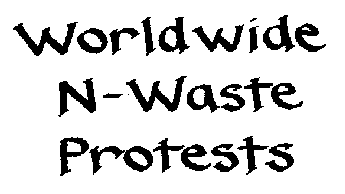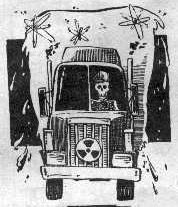

 |
 |
In late March, tens of thousands of Germans demonstrated against the first high-level nuclear waste transport in that country since 1998.
The latest CASTOR (waste cask) shipment of German reactor waste left a French reprocessing facility on March 26, preceded by months of intensive policing along the 300 mile German rail and truck route to the repository in Gorleben, site of massive resistance when the last CASTOR was delivered. Demonstrator's camps were all but banned this time, so local churches, businesses, barns and homes along the route gave hospitality to thousands who traveled to the region to block the shipments. Farmers and clergy, schoolchildren and teachers from scores of villages and towns in the region joined the resistance effort.
The shipment reached its destination more than a day behind
schedule and at an estimated cost of $50 million for the extra policing.
Demonstrators evaded police lines to block the tracks on several occasions.
In another location, four people, including one juvenile, chained
themselves inside pieces of concrete on the railway, stopping the waste
train for 14 hours. Some 45 Greenpeace activists occupied a railway
overpass, suspending some of their number in an aerial blockade of the
track below. Masked saboteurs begin removing some sections of track and
clashed with police.
In Luenenburg alone, five hundred people were arrested as police fired water cannons and swung batons to clear the peaceful but resolute blockaders. Out of hundreds arrested, all were reportedly released after a few hours in police custody waiting for the train to pass.
The Gorleben International Peace Team, assembled again to observe and report on the human rights situation during the protests, seeks support for their work as they prepare for the next CASTOR transport. Contact them at GIPT, Kirchstrasse 14, Wustrow 29462, Germany; gipt@gmx.net.
In addition to the mass arrests in Germany, nuclear waste shipments in at least three other countries have recently drawn resistance resulting in arrests.
The debate continues in the Russian Duma over proposed changes in
the law that would permit Russia to import reactor waste from other
countries. Reflecting popular opposition to nuclear waste imports,
including a petition of 2.5 million signatures, a second reading of the
proposed bill was postponed on March 22. Just before the Duma's action,
Greenpeace activists unfurled a large banner reading "Spent Nuclear Fuel?
Duma - Think Again" from above the entrance of the Moscow parliamentary
building. Three activists were arrested.
In Australia, nuclear proponents want to replace the aging Lucas Heights research reactor in Sydney, but first must demonstrate that 1,800 wasted fuel rods from the present reactor can be disposed of. Shipment to France for reprocessing is strongly opposed, and seven Greenpeace activists were arrested at a February demonstration when they blocked the reactor entrance and erected a banner declaring "Nuclear Reactors Waste the Planet."
Dutch police arrested 16 environmentalists on March 5 at two separate anti-nuclear protests which delayed waste shipments. Nine people from the activist group Omkruit were arrested after blocking a train carrying spent nuclear fuel from the Borssele nuclear plant to France for reprocessing. Seven Greenpeace members were arrested at a separate protest when they attempted to block a truck carrying irradiated nuclear fuel rods from the defunct Dodewaard plant from reaching the port at Vlissingen.
